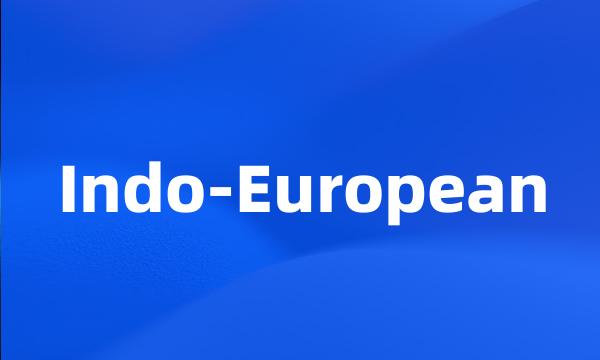Indo-European
- adj.印欧语系的(指欧洲大部分地区和西亚的部分地区的语言谱系,包括英语、法语、拉丁语、希腊语、瑞典语、俄语和印地语)
- n.印欧语系;说印欧语系语言的人
 Indo-European
Indo-European-
A sound law relating German consonants and consonants in other Indo-European languages .
讨论德语与印欧语系中辅音关联的语音法。
-
Chinese language has two characteristics , one is different from the Indo-European tonal , another is a vocal phonation types .
我国语言有两大特点,一是不同与印欧语系的声调,另一个是嗓音的发声类型。
-
Essential Existence of Language and Classic Tradition of Indo-European Language Research
语言的本质存在与印欧语言研究的古典传统
-
One reason why this change occurs is the influence of Indo-European language grammar .
这种变化之所以出现,原因之一是受到印欧语语法的影响。
-
The Indo-European language family is the first and most widely investigated language family of the world .
在世界上的各语系中,印欧语系是研究最早和最深的一种语系。
-
Classic tradition of Indo-European language connects with the research of essential existence .
印欧语言研究的古典传统是和对语言的本质存在的探究联系在一起的。
-
Its original inhabitants were Messapii , an Indo-European people later called Salentini .
萨伦托的原住民是梅萨皮人。这是一个印欧民族,后来被叫做萨伦托人。
-
The branch of the Indo-European language family that consists only of greek .
希腊语族仅由希腊语组成的印欧语系的一个分支。
-
A member of the people who spoke the parent language of the Indo-European languages .
讲印-欧语系语言的以印-欧语言为其母语的民族的一员。
-
The often dental consonant of no Indo-European language .
我们不满的时候经常用它在印欧语系中可找不到词源。
-
The genealogical Classification of the Indo-European language is based on the historical evolution of morphology and sound .
印欧语以形态和语音的历史演变为谱系分类的依据。
-
There was another group , who were not Indo-European , called Picts .
此外,还有一族叫做皮克特人,但他们不属于印欧语族。
-
The branch of the Indo-European family of languages including the Indic and Iranian language groups .
印度欧洲语族的一个分支包括印度语和伊朗语。
-
Chinese grammar studies modeled after the grammar models of Indo-European languages , which are not actually applicable to Chinese .
汉语语法模仿印欧语的语法系统,但这种系统并不适合汉语。
-
Where do Indo-European languages come from ?
印欧语系发源于何方?
-
An extinct branch of the Indo-European language family thought by some to be related to Armenian .
印-欧语系的一个灭绝的分支,被认为和亚美尼亚语有一些联系。
-
The Indo-European is the smallest family with only two languages : Russian and Tajik .
印欧语系是最小的家庭,只有两种语言:俄罗斯语和塔吉克斯坦语。
-
The noun can be the predicate directly , this is one of the main differences between Chinese and Indo-european languages .
名词可以直接做谓语,这是汉语和印欧语言的主要差别之一。
-
But the method used to compute the parameters in processing Indo-European languages must be adjusted before applying to Chinese-English corpora .
但评价函数中的参数计算不能采用处理印欧语种的方法,而要针对汉英语种的特点进行调整。
-
A member of a Caucasian people living in the Caucasus but not speaking an Indo-European language .
居住在高加索山脉但是不说印欧语言的高加索民族的人。
-
Latin : The Indo-European language of the ancient Latins and Romans .
拉丁语:古拉丁人和罗马人的印欧语言。
-
Any of the Indo-European languages of these peoples .
伊利里亚语这些民族使用的印欧语言中的任意一种。
-
The Indo-European language spoken predominantly in Armenia . Americans had long admired Europe 's canals .
绝大多数亚美尼亚人说的印-欧语。美国人早就羡慕欧洲那些运河。
-
Indo-European speakers followed them from Sri Lanka in the fourth and fifth centuries BC .
公元前第四和第五世纪,印度的欧洲演说者们跟着印度人从斯里兰卡进入马尔代夫。
-
Bopp : German philologist whose Comparative Grammar ( 1833-1852 ) illustrated the similarities among Indo-European languages .
波普:德国哲学家,他的《比较语法》(1833-1852年)举例说明了印欧语系各语言间的相同点。
-
As an independent branch of the Indo-European family of languages , the Greek language features the longest and most documented history .
作为印欧语系语言的独立分支,希腊语具有历史悠久、记录完善的特点。
-
A prehistoric unrecorded language that was the ancestor of all Indo-European languages .
一种古老的无记载的语言是所有印-欧语系的祖先。
-
Dutch , and English like the British , German , Dutch belong to the same Indo-European Germanic West Extension .
荷兰语,和英语很像,英、德、荷兰语同属印欧语系日耳曼语族西支。
-
A minor and almost extinct branch of the Indo-European languages ; spoken along the Dalmatian coast .
印-欧语的一个较小的几乎灭绝的分支;分布于大麦町海岸。
-
The word " four " experienced a linguistic evolutionary leap that makes it significantly younger in English and different from other Indo-European languages .
英文数字四由于经历过一次语言上的进化过程,所以更为年轻一些,它和其它欧印语种的发音也大为不同。
